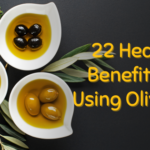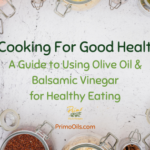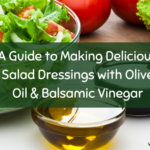People celebrate balsamic vinegar for both its unique flavor and its contributions to wellness. Originating from Italy, this distinctive vinegar is made from grape must that has been fermented and aged, often for many years, in order to develop its rich and complex taste. In the realm of health, balsamic vinegar is noted for its potential to offer various benefits, thanks in part to its content of antioxidants, acetic acid, probiotics, and micronutrients.
While it is widely used in the culinary world as a flavor enhancer in dressings, marinades, and glazes, the value of balsamic vinegar extends well beyond the kitchen. Studies suggest that the compounds found in balsamic vinegar may support various aspects of health, including managing blood glucose levels, aiding in digestion, and contributing to heart health. Premium varieties of balsamic vinegar like those we stock here at Primo Oils, contain no fat and are low in calories, making them an attractive addition to a health-conscious diet.
Key Takeaways
- Balsamic vinegar is rich in compounds that may support health and wellness.
- Its versatility in the kitchen makes it a popular choice for enhancing a multitude of dishes.
- Incorporating balsamic vinegar into meals can contribute to a balanced, nutritious diet.
Balsamic Vinegar at Primo
When Bob & Beverly opened an Olive Oil and Vinegars store, they were primarily focused on how absolutely delicious these condiments are. They knew that cooking with high-quality ingredients and unprocessed foods was good, but they were unaware of just HOW good these ingredients actually were.
Fast forward to today, when they are in partnership with Miranda Sommer and her Reset with Miranda program to bring delicious, high-quality ingredients to people throughout the United States. Olive Oil and Balsamic Vinegar have so many incredible health properties. And balsamic vinegar, in particular, is a star among condiments.
In order to truly appreciate this unique ingredient, we want to take some time to explore the health benefits of balsamic vinegar to back up what we know to be true. Eating healthy and delicious meals isn’t hard, it’s our mission here at Primo.
Nutritional Profile of Balsamic Vinegar
Balsamic vinegar, a popular condiment with a rich history, boasts a unique nutritional composition that enhances dishes without adding excessive calories.
Main Components
Balsamic vinegar’s primary ingredients include grape must (crushed grape juice complete with skins, seeds, and stems) and wine vinegar. High-quality variants are aged in wooden barrels, acquiring unique flavors and properties. Most balsamic vinegars contain:
- Acetic acid: gives the vinegar its distinct tartness.
- Antioxidants: such as polyphenols from grapes.
- No fat: making it a heart-healthy choice.
Caloric Content
A typical serving, which is about one tablespoon (15 ml), generally contains approximately:
- Calories: 14
- Carbohydrates: 2.7g
- Natural sugars: contributes a subtle sweetness.
- No added sugar: keeping the caloric content lower.
This makes balsamic vinegar an excellent choice for adding flavor to salads or dishes without significantly increasing caloric intake. It’s also one of the main reasons why Miranda Sommer relies on this as part of her Reset program.
Vitamins and Minerals
While balsamic vinegar isn’t a significant source of vitamins and minerals, it still contributes small amounts to one’s diet, including:
- Potassium: aids in muscle function and fluid balance.
- Calcium: supports bone health.
- Iron: essential for transporting oxygen in the blood.
- Magnesium: important for many biochemical reactions in the body.
- Phosphorus: critical for cell repair and maintenance.
These nutrients vary depending on the grape variety and fermentation process. Although the amounts are minute, they can complement a balanced diet.
11 Health Benefits of Balsamic Vinegar 
Balsamic vinegar is more than just a flavor enhancer for salads and dishes. There are many balsamic vinegar health benefits, ranging from aiding digestion to supporting heart health.
Digestive Health
Balsamic vinegar is rich in acetic acid, which can help promote good digestion. It works by increasing the impact of pepsin, an enzyme that breaks down protein into smaller amino acids that can be more easily absorbed by the body.
Blood Sugar Control
This flavorful vinegar can also help with blood sugar control. Incorporating balsamic vinegar into meals may limit spikes in blood glucose levels, making it a beneficial choice for individuals managing type 2 diabetes.
Antioxidant Properties
The antioxidants in balsamic vinegar, such as polyphenols, play a role in protecting the body against oxidative stress. These antioxidants can also combat cell damage and promote healthy aging.
Weight Management
For those conscious about weight, balsamic vinegar can be a helpful tool. Its ability to add flavor without the excess calories and its potential to contribute to a feeling of fullness might assist in weight management efforts.
Heart Health
The positive effects of balsamic vinegar extend to heart health as well. Its components are known to help lower cholesterol and improve circulation, which might lower the risk of heart problems. Regular consumption might contribute to better cardiovascular health. This is one of the most powerful benefits of balsamic vinegar.
Enjoy Your Food
When you use high-quality ingredients like our balsamic vinegar, you are going to notice an incredible difference in how your food tastes. It’s so much easier to choose something healthy when it tastes good. Food is meant to be enjoyed and we’re excited to share the many balsamic vinegar flavor combinations that will enhance your next dish.
Lower Cholesterol
Another amazing health benefit of balsamic vinegar is that it can help control high cholesterol or maintain a healthy low cholesterol level. A 2019 study, done on rabbits with high levels of cholesterol, found that a regular consumption of balsamic vinegar as part of an atherogenic diet helped lower LDL and inflammation.
Lower Blood Pressure
Blood pressure can be linked to diet and/or genetics. Either way, researchers have found balsamic vinegar to be useful. Antioxidants, of which balsamic vinegar has many, has been found to help lower blood pressure. Balsamic vinegar contains polyphenols which help relax blood vessels, which lowers your blood pressure.
Assists with a Low-Sodium Diet
If your doctor has asked you to try a low-sodium diet in order to lower your blood pressure, balsamic vinegar can help to add flavor and spice without the salt. Add balsamic vinegar to dishes instead of using salt or other salt flavored products to help add more flavor to your meal.
Reducing Acid Reflux
Balsamic vinegar has low acidity. When used in moderation, it can add to the production of saliva, which helps soothe an acidic stomach and aids with digestion. This has varying degrees of success for people who suffer from acid reflux, but it’s worth a try. You can start reaping the benefits of balsamic vinegar for your health by using it in a salad dressing. Read our article on how to make delicious salad dressings here.
Improving Blood Circulation
Another balsamic vinegar benefit is the study which found that grape juice helped reduce platelet aggregation in the blood. This means that the polyphenols in grape products (wine, juice and balsamic vinegar) can help thin your blood. This in turn can help lower your risk for cardiovascular disease.
Health Benefits of Balsamic Vinegar vs Apple Cider Vinegar 
Balsamic vinegar and apple cider vinegar can improve the health benefits of your food when eaten in moderation, but they are not good supplements for one another. For one, balsamic vinegar has a sweeter, darker flavor profile. Apple cider vinegar (or commonly known as ACV in the health community) is lighter with a tangier bite. They each have additional vitamins and nutrients that they can add to your diet. But while balsamic vinegar touts its antioxidant levels, ACV is more helpful due to its probiotic content. They are both great to add to a healthy diet.
How to Incorporate Balsamic Vinegar Into Your Diet
Balsamic vinegar enriches the flavors of various dishes, offering both sweet and tangy taste profiles. Here at Primo we can show you how to use it to enhance salads, cheeses, fruits, and even desserts. Also, have you ever tried a Primotini?
- Salad Dressings: A drizzle of balsamic vinegar can be mixed with olive oil for a classic vinaigrette.
- Reductions: Cooking it down creates a thicker sauce that beautifully complements roasted meats and vegetables.
- Desserts: A small amount can be drizzled over strawberries or vanilla ice cream.
- Cheese Pairing: Parmesan and other aged cheeses pair well with its robust flavor.
- Fruit Complements: Fruits like peaches and pears are elevated when paired with balsamic vinegar.
For those interested in food pairings in, Balsamic Vinegar: the Perfect Pairings with Food we suggest matching traditional balsamic vinegar with dishes that bring out its unique flavors and properties.
Regarding preparation:
- Always start with a small amount; its flavor is potent.
- For a balanced dish, combine it with complimentary flavors like olive oil or creamy cheeses.
- Creative uses include adding it to marinades or even fresh fruit to enhance their natural sweetness.
Safe Consumption and Considerations
When including balsamic vinegar in their diet, individuals should be mindful of the quantity and frequency of its use. While balsamic vinegar offers various health benefits, it is also high in acidity which may cause issues for some people with sensitive stomachs or acid reflux.
- Caloric Content: Despite its health properties, balsamic vinegar contains calories which can add up. One should account for the caloric intake to maintain a balanced diet.
To prevent dental erosion, consuming acidic foods or condiments such as balsamic vinegar should be followed by rinsing the mouth with water. Dilution of the vinegar before consumption is also advisable.
- Tooth Health: It’s acidic nature can potentially affect tooth enamel if used excessively. Moderation is key.
In addition, certain balsamic vinegars may contain added sugars and coloring, so reading labels and choosing high-quality organic and pure balsamic vinegar can ensure avoidance of unnecessary additives. This is not true of the balsamic vinegars that we carry at Primo Oils but if you are purchasing from another source make sure to check your label.
| Consideration | Suggestion |
| Acidity | Dilute with water; rinse mouth after |
| Caloric Content | Incorporate into a calorie-controlled diet |
| Tooth Enamel Safety | Use in moderation; Maintain oral hygiene |
| Additives | Opt for organic and pure varieties with no added sugars |
Individuals with diabetes need to be aware that some balsamic vinegars can cause an increase in blood sugar levels. They should select varieties with lower amounts of natural sugars and consult with a healthcare provider.
For those looking to add balsamic vinegar to their diet, they should begin by integrating small amounts to observe how their body reacts, both to enjoy its benefits and to minimize potential risks.
In general, before making changes to your diet, it’s best to consult with your doctor.
If you’re in Louisville, we would love to invite you to stop by Primo for a free balsamic vinegar tasting. Trust us, once you’ve experienced our Fig Balsamic Vinegar you’ll never look at balsamic vinegar the same way again.
And if you’re not local, why not try a 4 or 6 pack of our sampler sets to see which flavors you enjoy.
Frequently Asked Questions
In this section, we address common inquiries about balsamic vinegar, focusing on its potential to enhance skin health, its recommended intake, how it might promote weight loss, and any possible side effects. We also explore the combination of balsamic vinegar and olive oil and compare the health benefits of different vinegars.
Can balsamic vinegar improve skin health?
Balsamic vinegar may contribute to better skin complexion due to its antioxidant properties. Antioxidants can help protect the skin from oxidative stress. Medical News Today discusses how these antioxidants can potentially improve the skin’s appearance.
What is the recommended daily intake of balsamic vinegar for health benefits?
While there is no standardized daily intake, it’s generally advised to consume balsamic vinegar in moderation due to its acidity. GaultsDeli suggests that too much can lead to adverse effects, and it’s wise to consult healthcare professionals for dietary advice.
How does balsamic vinegar aid in weight loss?
Balsamic vinegar has a strong, complex taste that can help in reducing calorie intake by enhancing the flavor of food, thus possibly aiding in weight management. According to MSN, it’s not a magic weight-loss solution, but its intense taste may help people feel more satisfied with less food.
Does drinking balsamic vinegar have health benefits?
Drinking balsamic vinegar can be healthy in moderation. As we discussed above, it is high in antioxidants, which can help you in a number of ways, including assisting with managing diabetes, heart disease, and acid reflux, to name a few of the health benefits of balsamic vinegar. However, dentists have come out to warn of the danger that balsamic vinegar can have to your teeth when overused. A viral trend on TikTok spouting the significant benefits of balsamic vinegar as a substitute for soda forgot to mention that it is good when used in moderation. If you have questions, reach out to your dentist for their specific recommendations.
Are there any side effects associated with consuming balsamic vinegar?
When consumed excessively, the acidity of balsamic vinegar can potentially cause digestive issues, and due to its sugar content, it might affect blood sugar levels. Consulting with a healthcare professional before adjusting your diet is always recommended.
What are the health benefits of balsamic vinegar and olive oil?
Blending balsamic vinegar with olive oil can enhance the antioxidant profile of a dish, providing a combination that supports heart health and the body’s defense against oxidative damage.
How do different types of vinegar, including balsamic, compare in terms of health benefits?
Different types of vinegars contain varying levels of acetic acid and antioxidants, which affect their health benefits. For example, balsamic vinegar is known for its antioxidants that can aid digestion and improve skin health, while others, like apple cider vinegar, might have their own distinct advantages for overall wellness.






